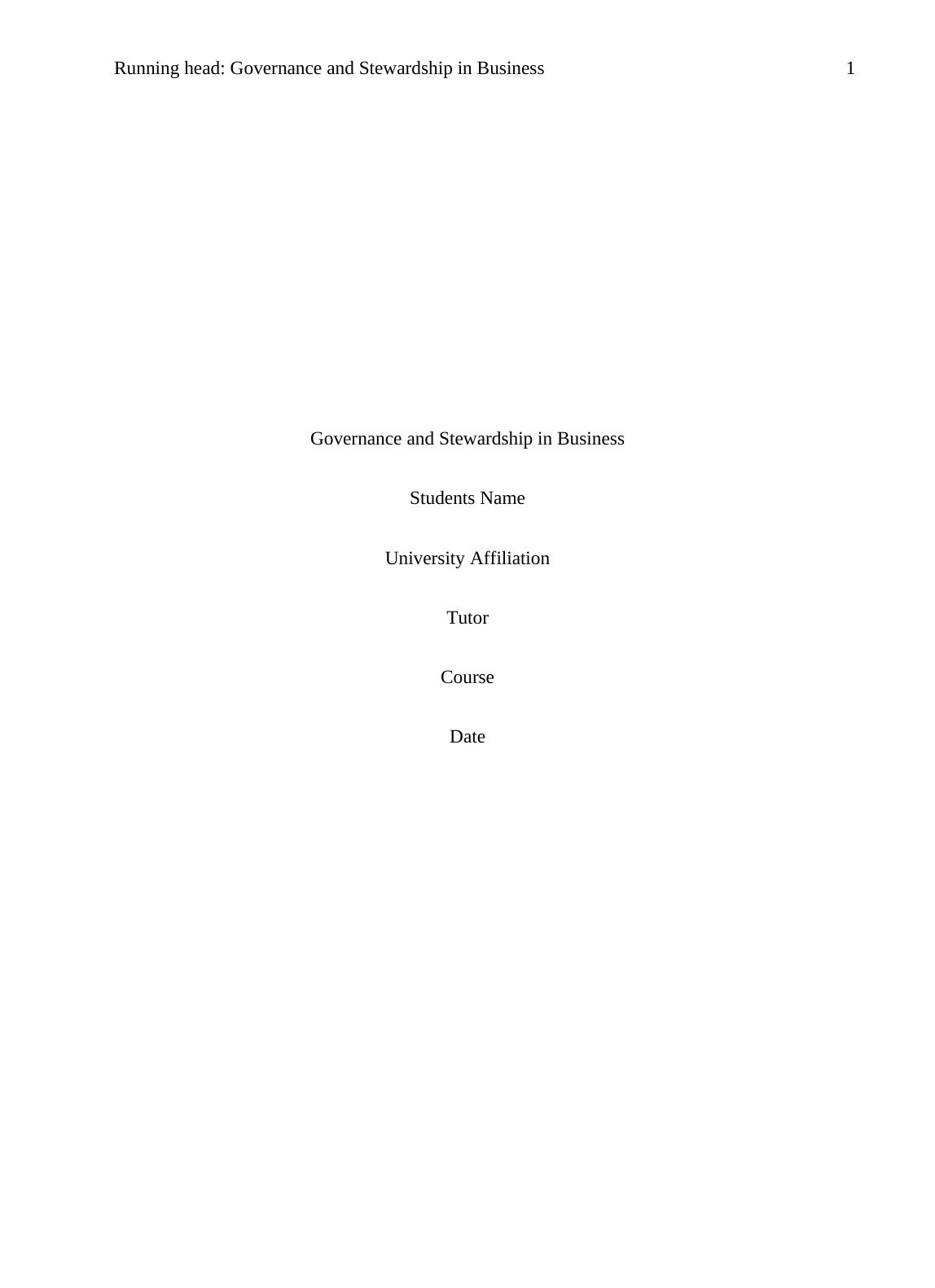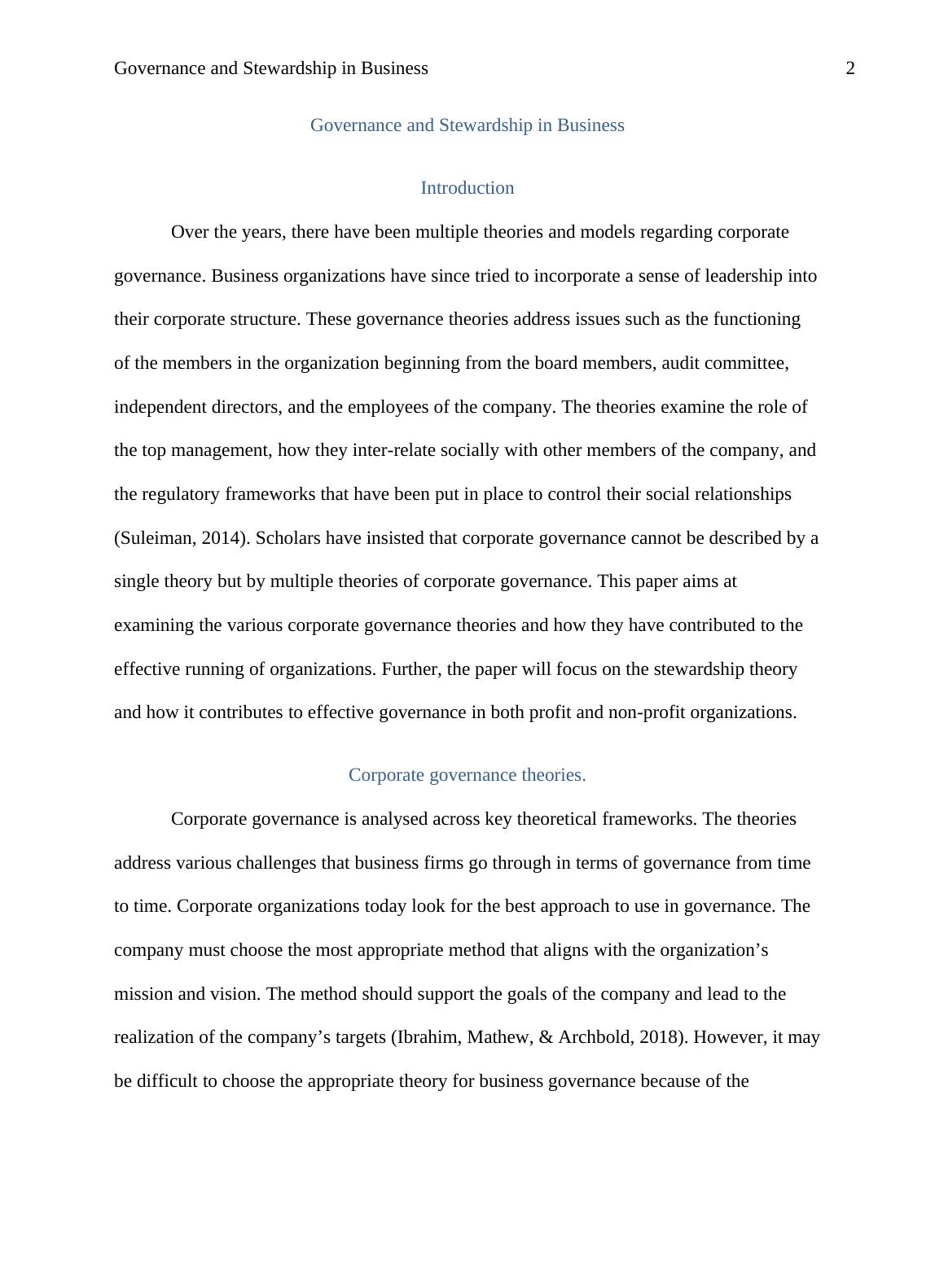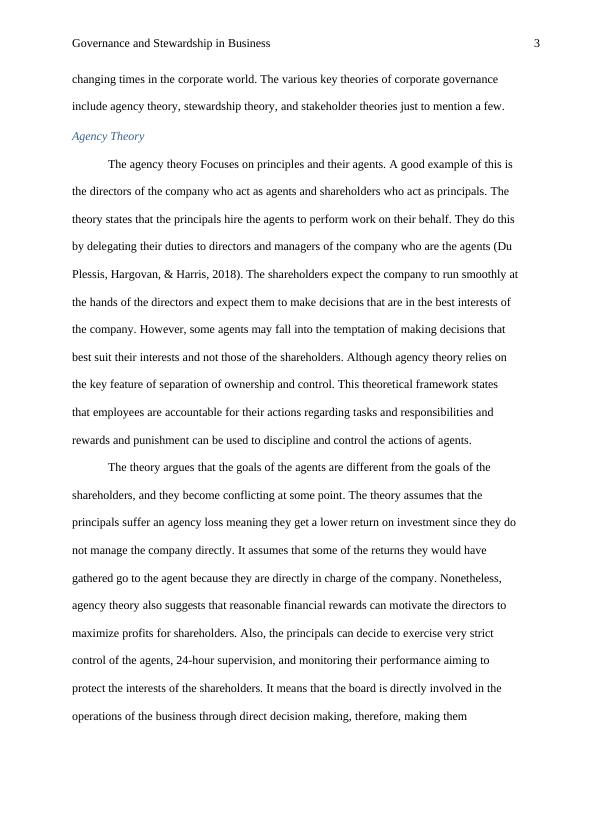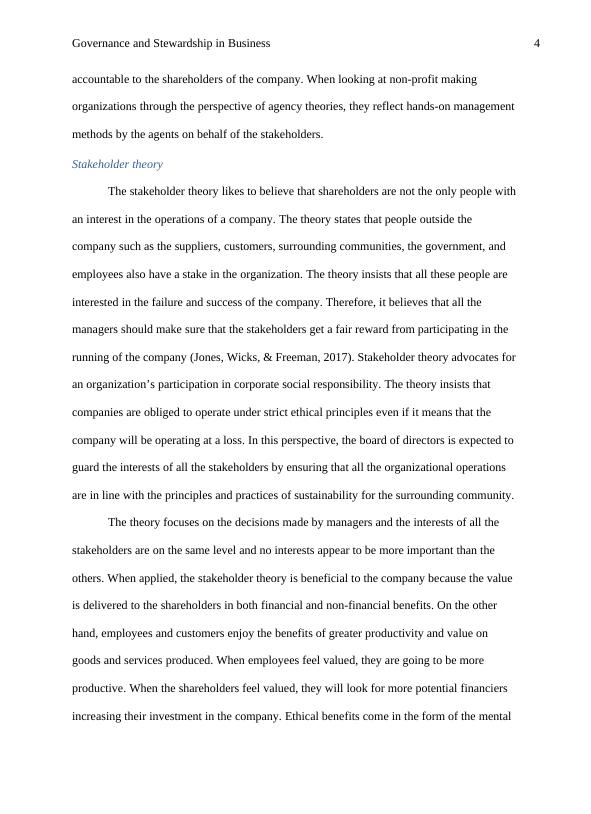Governance and Stewardship in Business Assignment
12 Pages3049 Words47 Views
Added on 2020-11-02
Governance and Stewardship in Business Assignment
Added on 2020-11-02
ShareRelated Documents
Running head: Governance and Stewardship in Business1Governance and Stewardship in BusinessStudents NameUniversity AffiliationTutorCourseDate

Governance and Stewardship in Business2Governance and Stewardship in BusinessIntroductionOver the years, there have been multiple theories and models regarding corporate governance. Business organizations have since tried to incorporate a sense of leadership intotheir corporate structure. These governance theories address issues such as the functioning of the members in the organization beginning from the board members, audit committee, independent directors, and the employees of the company. The theories examine the role of the top management, how they inter-relate socially with other members of the company, andthe regulatory frameworks that have been put in place to control their social relationships (Suleiman, 2014). Scholars have insisted that corporate governance cannot be described by asingle theory but by multiple theories of corporate governance. This paper aims at examining the various corporate governance theories and how they have contributed to the effective running of organizations. Further, the paper will focus on the stewardship theory and how it contributes to effective governance in both profit and non-profit organizations. Corporate governance theories.Corporate governance is analysed across key theoretical frameworks. The theories address various challenges that business firms go through in terms of governance from time to time. Corporate organizations today look for the best approach to use in governance. The company must choose the most appropriate method that aligns with the organization’s mission and vision. The method should support the goals of the company and lead to the realization of the company’s targets (Ibrahim, Mathew, & Archbold, 2018). However, it maybe difficult to choose the appropriate theory for business governance because of the

Governance and Stewardship in Business3changing times in the corporate world. The various key theories of corporate governance include agency theory, stewardship theory, and stakeholder theories just to mention a few. Agency TheoryThe agency theory Focuses on principles and their agents. A good example of this is the directors of the company who act as agents and shareholders who act as principals. The theory states that the principals hire the agents to perform work on their behalf. They do this by delegating their duties to directors and managers of the company who are the agents (Du Plessis, Hargovan, & Harris, 2018). The shareholders expect the company to run smoothly atthe hands of the directors and expect them to make decisions that are in the best interests of the company. However, some agents may fall into the temptation of making decisions that best suit their interests and not those of the shareholders. Although agency theory relies on the key feature of separation of ownership and control. This theoretical framework states that employees are accountable for their actions regarding tasks and responsibilities and rewards and punishment can be used to discipline and control the actions of agents. The theory argues that the goals of the agents are different from the goals of the shareholders, and they become conflicting at some point. The theory assumes that the principals suffer an agency loss meaning they get a lower return on investment since they donot manage the company directly. It assumes that some of the returns they would have gathered go to the agent because they are directly in charge of the company. Nonetheless, agency theory also suggests that reasonable financial rewards can motivate the directors to maximize profits for shareholders. Also, the principals can decide to exercise very strict control of the agents, 24-hour supervision, and monitoring their performance aiming to protect the interests of the shareholders. It means that the board is directly involved in the operations of the business through direct decision making, therefore, making them

Governance and Stewardship in Business4accountable to the shareholders of the company. When looking at non-profit making organizations through the perspective of agency theories, they reflect hands-on management methods by the agents on behalf of the stakeholders. Stakeholder theoryThe stakeholder theory likes to believe that shareholders are not the only people withan interest in the operations of a company. The theory states that people outside the company such as the suppliers, customers, surrounding communities, the government, and employees also have a stake in the organization. The theory insists that all these people are interested in the failure and success of the company. Therefore, it believes that all the managers should make sure that the stakeholders get a fair reward from participating in the running of the company (Jones, Wicks, & Freeman, 2017). Stakeholder theory advocates foran organization’s participation in corporate social responsibility. The theory insists that companies are obliged to operate under strict ethical principles even if it means that the company will be operating at a loss. In this perspective, the board of directors is expected to guard the interests of all the stakeholders by ensuring that all the organizational operations are in line with the principles and practices of sustainability for the surrounding community. The theory focuses on the decisions made by managers and the interests of all the stakeholders are on the same level and no interests appear to be more important than the others. When applied, the stakeholder theory is beneficial to the company because the value is delivered to the shareholders in both financial and non-financial benefits. On the other hand, employees and customers enjoy the benefits of greater productivity and value on goods and services produced. When employees feel valued, they are going to be more productive. When the shareholders feel valued, they will look for more potential financiers increasing their investment in the company. Ethical benefits come in the form of the mental

End of preview
Want to access all the pages? Upload your documents or become a member.
Related Documents
Corporate Governance and Financial Regulation - Deskliblg...
|12
|3297
|258
Report on Corporate Governance Theorieslg...
|4
|706
|126
Social and Environmental Reporting - Assignmentlg...
|9
|2138
|20
Governance and Stewardshiplg...
|13
|3023
|399
Corporate Law and Governancelg...
|10
|3647
|33
Corporate Governance and Stewardship - Doclg...
|12
|3429
|166
